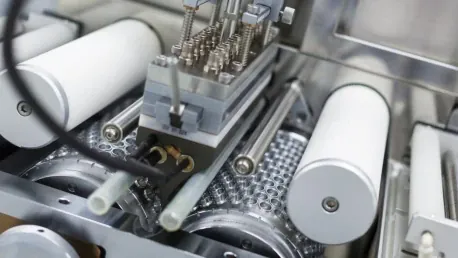Integrating cutting-edge software solutions in industrial environments has become a game changer, demonstrating substantial improvements in efficiency, cost-saving, and quality assurance. Baker Hughes has exemplified this by leveraging Oqton Manufacturing OS to enhance its additive manufacturing (AM) operations, yielding significant benefits in terms of efficiency, cost reduction, and quality assurance.
Revolutionizing Efficiency and Scalability
Comprehensive Workflow Integration
One of the foremost advantages of integrating Oqton Manufacturing OS into Baker Hughes’ AM operations is the substantial increase in production efficiency. The software’s holistic approach allows for an all-encompassing factory-floor workflow integration. From managing raw materials to tracking the finished part, this system ensures that every step is optimized and traceable. This comprehensive workflow integration is particularly crucial in highly regulated industries such as oil and gas, where compliance with stringent standards is non-negotiable. The seamless traceability from raw material procurement to finished part delivery aligns perfectly with Baker Hughes’ rigorous quality control measures, ensuring consistency throughout the production lifecycle.
Moreover, the software offers a unified platform that consolidates various operational elements, minimizing the need for manual intervention and significantly reducing potential errors. The integration not only enhances the operational workflow but also creates a connected ecosystem, where data flows seamlessly between different production stages. By doing so, Baker Hughes can maintain real-time visibility into the production process, making it easier to identify bottlenecks, anticipate issues, and implement corrective measures proactively. This holistic approach to workflow integration provides an unparalleled level of control and precision, driving both efficiency and regulatory compliance.
Scaling Production Output
In addition to streamlined workflows, Baker Hughes has achieved a significant scaling of production output through the integration of Oqton’s software. The enhancement of various manufacturing processes has enabled the company to handle larger workloads without compromising on quality. This improvement in scalability is vital as it allows Baker Hughes to meet growing market demands while maintaining the high standards expected in the industry. The ability to scale production rapidly and efficiently places the company in a strong competitive position, allowing it to respond swiftly to market changes and customer needs.
The software’s capabilities also facilitate the automation of repetitive and time-consuming tasks, freeing up human resources to focus on more strategic and complex activities. This shift not only improves productivity but also fosters innovation within the workforce, as employees can dedicate more time to value-added tasks that drive business growth. By leveraging Oqton Manufacturing OS, Baker Hughes can optimize its resource allocation, ensuring that both human and machine resources are utilized to their fullest potential. This strategic approach to scaling production output ensures that the company can sustain growth without overextending its operational capabilities.
Drastic Reductions in Monitoring Time and Costs
Reduction in Engineering Time
A standout achievement resulting from this integration is the significant reduction in active monitoring engineering time. Oqton’s solution has led to a 98% decrease in this area, translating to impressive annual savings of 136 engineering hours per printer. This efficiency not only frees up valuable resources but also allows engineers to focus on more critical tasks that drive innovation and improvement. By automating the monitoring processes, the manufacturing team can shift their attention from routine oversight to strategic planning and development, resulting in a more dynamic and forward-thinking engineering department.
Furthermore, the reduction in active monitoring time also contributes to improved job satisfaction among engineers, as they are able to engage in more intellectually stimulating work. The integration of Oqton Manufacturing OS effectively transforms the role of engineers from reactive problem solvers to proactive innovators, fostering a culture of continuous improvement and creativity. This shift not only benefits Baker Hughes in terms of operational efficiency but also enhances employee morale and retention, creating a more motivated and skilled workforce dedicated to driving the company’s success.
Cost Reductions in Scrap and Resource Wastage
The automated reporting functions provided by Oqton have further reduced root cause analysis time by 98%, facilitating faster resolution of production issues and decreased resource wastage. This leads to notable financial benefits, including an 18% reduction in scrap-related expenses, underscoring the importance of improved process control and defect management. The ability to quickly identify and address the root causes of production issues means that Baker Hughes can minimize disruptions and maintain a smooth and efficient manufacturing process. This streamlined approach to problem-solving not only reduces costs but also enhances overall productivity and product quality.
Additionally, the financial savings achieved through reduced scrap and resource wastage can be reinvested into the business, funding further innovations and improvements. This creates a virtuous cycle of continuous enhancement and growth, driven by the efficiencies gained from the integration of Oqton Manufacturing OS. By maintaining a sharp focus on process optimization and defect management, Baker Hughes can ensure that its manufacturing operations remain cost-effective and competitive. The strategic deployment of these savings underscores the company’s commitment to operational excellence and long-term sustainability.
Automation Enhancing Quality Assurance
Automating Complex Processes
Automation is a key feature of the Oqton Manufacturing OS, facilitating the handling of complex processes such as order requirement fulfillment, design revisions, and qualified build setups. By automating these intricate tasks, the software ensures consistent quality assurance throughout the production cycle. This consistent quality is imperative in maintaining the integrity of products, especially in regulated environments where any deviation from the norm can have significant repercussions. The automation capabilities of Oqton Manufacturing OS provide a reliable and consistent approach to quality control, ensuring that each product meets the stringent standards required by the industry.
Moreover, the automation of complex processes minimizes the risk of human error, which is often a significant factor in quality issues. By relying on advanced software to manage these tasks, Baker Hughes can achieve a higher level of precision and consistency in its manufacturing operations. This not only enhances product quality but also builds trust with customers and regulatory bodies, reinforcing the company’s reputation for excellence. The automation of these processes also allows for more efficient use of resources, as tasks that would traditionally require significant manual effort can now be completed quickly and accurately by the software.
Ensuring Stringent Regulatory Standards
For industries like oil and gas, meeting stringent regulatory standards is paramount. Oqton’s software guarantees full traceability and compliance across all production stages, ensuring that every part of the manufacturing process adheres to the required guidelines. This meticulous approach to quality control not only prevents lapses but also fosters confidence among regulatory bodies and end-users. The ability to demonstrate compliance through comprehensive and traceable records is a significant advantage for Baker Hughes, as it enhances transparency and accountability in the manufacturing process.
In addition, the software’s traceability features allow Baker Hughes to quickly and efficiently respond to any regulatory inquiries or audits. The ability to provide detailed records and demonstrate compliance at every stage of production ensures that the company is always prepared to meet regulatory requirements. This proactive approach to regulatory compliance not only mitigates risks but also strengthens the company’s position in the market, as it highlights Baker Hughes’ commitment to maintaining the highest standards of quality and safety. The integration of Oqton Manufacturing OS thus plays a crucial role in ensuring that Baker Hughes remains at the forefront of the industry.
Strategic Partnership Driving Transformation
Baker Hughes and 3D Systems Alliance
The collaboration between Baker Hughes and Oqton, a subsidiary of 3D Systems, exemplifies how strategic partnerships can drive industrial transformation. Reji Puthenveetil, EVP of additive solutions and chief commercial officer at 3D Systems, emphasizes the significance of this deployment, highlighting how it showcases the Manufacturing OS’s capacity to drive efficiencies, boost automation, and realize savings. This partnership not only benefits both companies but also serves as a model for how collaboration and innovation can lead to substantial advancements in industrial practices.
The strategic alliance between Baker Hughes and 3D Systems demonstrates the transformative power of combining expertise and technology to achieve common goals. By leveraging Oqton’s advanced software solutions and 3D Systems’ extensive experience in additive manufacturing, Baker Hughes can enhance its operational capabilities and drive significant improvements in efficiency and quality. This partnership serves as a testament to the potential of collaborative efforts in pushing the boundaries of what is possible in industrial manufacturing, setting a new standard for excellence and innovation in the industry.
Broader Implications for the Industry
This successful integration serves as a model for other companies considering similar technological adoptions. It demonstrates the transformative potential of advanced manufacturing software in revolutionizing traditional production processes. Other industries can glean insights from this case study, understanding how digital solutions can dramatically improve operational efficiency and cost-effectiveness. The success of Baker Hughes and Oqton highlights the importance of embracing technological advancements to stay competitive and achieve sustainable growth in an increasingly digital landscape.
The broader implications of this integration extend beyond immediate operational benefits, as it showcases the potential for large-scale digital transformation across various sectors. By adopting similar technological solutions, companies in different industries can enhance their manufacturing capabilities, reduce costs, and improve product quality. The case study of Baker Hughes and Oqton serves as a compelling example of how digital innovation can drive significant improvements in industrial practices, paving the way for a more efficient and sustainable future.
Real-world Impact and Future Prospects
Proven Benefits in Industrial Settings
The real-world impact of Oqton Manufacturing OS at Baker Hughes showcases its practical benefits in an industrial setting. The clear improvements in production efficiency and compliance hint at the broader applicability of such software solutions across various sectors. Companies looking to enhance their manufacturing operations should consider similar integrations. The success of this implementation demonstrates that advanced software solutions can bring about substantial operational improvements, making them a valuable investment for any organization seeking to optimize its manufacturing processes.
The proven benefits of Oqton Manufacturing OS in enhancing production efficiency and compliance also highlight the potential for scalability across different industries. By adopting similar digital solutions, companies can achieve significant improvements in their operational performance, driving growth and competitiveness in the market. The case study of Baker Hughes serves as a powerful example of the transformative impact of advanced software solutions, encouraging other organizations to explore similar innovations to achieve their own operational excellence.
Future Integration with EOS Systems
Integrating advanced software solutions in industrial settings has revolutionized traditional operations, leading to notable improvements in efficiency, cost savings, and quality assurance. This approach not only streamlines processes but also optimizes resource utilization, ensuring businesses remain competitive in a fast-paced market. Baker Hughes exemplifies this transformation by implementing the Oqton Manufacturing OS to refine its additive manufacturing (AM) operations. By leveraging this sophisticated software, Baker Hughes has seen significant enhancements in operational efficiency, reduced costs, and elevated quality standards. These advancements demonstrate the potential of cutting-edge technology in reshaping industry practices.
Moreover, such systems provide real-time data analytics, enabling companies to detect and address issues promptly, thus minimizing downtime and maximizing productivity. This results in smoother workflows and better compliance with stringent industry regulations. As industries globally continue to evolve, adopting such technology becomes imperative for companies aiming to maintain a competitive edge. In essence, the integration of innovative software like Oqton Manufacturing OS in industrial environments serves as a game changer, driving substantial gains in efficiency, cost reduction, and quality assurance.









